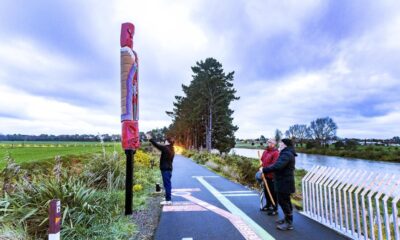Top Stories
Rangitāne and Palmerston North Council Relationship Strained

The relationship between the Rangitāne iwi and the Palmerston North City Council has come under strain following a recent council vote that excluded iwi representatives from key committees. During a council meeting on October 4, 2023, the council reached an 8-8 deadlock on Mayor Grant Smith’s proposal to appoint two iwi representatives with voting rights to the newly formed arts, culture, and heritage committee.
Danielle Harris, chief executive of Tanenuiarangi Manawatū, expressed disappointment with the council’s decision, labeling it a “very poor decision” that has negatively impacted the relationship between the iwi and the council. She argued that the council’s reasoning against the appointments was “obtuse and spurious,” especially given the collaborative successes achieved over the past few years.
Harris highlighted that in the previous council term, a joint Rangitāne o Manawatū committee existed, and prior to that, iwi representatives were included on most major committees. “We added value, not just thinking about Rangitāne, but about the whole city,” she stated, emphasizing the importance of their contributions.
The debate within the council included concerns raised by Councillor William Wood, who argued against having non-elected members with voting rights on major committees making city-wide decisions. He proposed alternatives, such as appointing representatives without voting rights or limiting their voting to specific cultural projects like the Te Motu o Poutoa cultural centre.
Despite the failed proposal, Smith reassured that the council-iwi relationship remains intact, although it has taken “a sideways move” due to the vote. He noted that the council is still legally bound to maintain a meaningful relationship with mana whenua Rangitāne. “This is just a moment in time,” he remarked, reflecting on the situation.
The Rangitāne o Manawatū Settlement Trust also expressed disappointment, stating that the decision contradicts the spirit of partnership established through the Kawenata agreement. They emphasized the long-standing collaborative relationship with the council, particularly with Smith and council leadership.
Harris underscored the need for ongoing dialogue, stating that after 900 years, Rangitāne is not going away. She called for renewed efforts to rebuild the relationship, noting that the council’s decision is out of touch with the constituents who voted to retain Māori wards.
The outcome of this vote has significant implications for how local governance and representation are structured, particularly regarding the inclusion of indigenous voices in decision-making processes. As the council navigates this contentious issue, both sides appear committed to finding a path forward that respects the rights and contributions of the Rangitāne iwi.
-

 Sports2 months ago
Sports2 months agoNetball New Zealand Stands Down Dame Noeline Taurua for Series
-

 Entertainment2 months ago
Entertainment2 months agoTributes Pour In for Lachlan Rofe, Reality Star, Dead at 47
-

 Entertainment1 month ago
Entertainment1 month agoNew ‘Maverick’ Chaser Joins Beat the Chasers Season Finale
-

 Sports2 weeks ago
Sports2 weeks agoEli Katoa Rushed to Hospital After Sideline Incident During Match
-

 Sports2 months ago
Sports2 months agoSilver Ferns Legend Laura Langman Criticizes Team’s Attitude
-

 Politics1 month ago
Politics1 month agoNetball NZ Calls for Respect Amid Dame Taurua’s Standoff
-

 Sports1 week ago
Sports1 week agoJamie Melham Triumphs Over Husband Ben in Melbourne Cup Victory
-

 Entertainment3 months ago
Entertainment3 months agoKhloe Kardashian Embraces Innovative Stem Cell Therapy in Mexico
-

 World3 months ago
World3 months agoPolice Arrest Multiple Individuals During Funeral for Zain Taikato-Fox
-

 Sports3 months ago
Sports3 months agoGaël Monfils Set to Defend ASB Classic Title in January 2026
-

 Entertainment2 months ago
Entertainment2 months agoTyson Fury’s Daughter Venezuela Gets Engaged at Birthday Bash
-

 Sports2 months ago
Sports2 months agoHeather McMahan Steps Down as Ryder Cup Host After Controversy



















